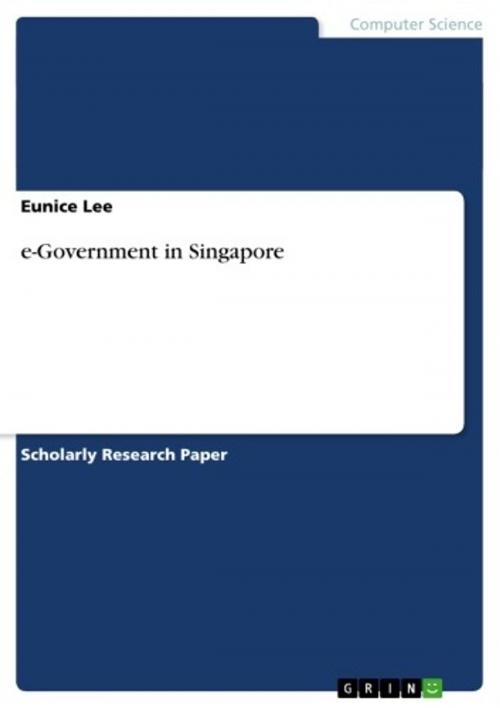| Author: | Eunice Lee | ISBN: | 9783638382090 |
| Publisher: | GRIN Publishing | Publication: | May 31, 2005 |
| Imprint: | GRIN Publishing | Language: | English |
| Author: | Eunice Lee |
| ISBN: | 9783638382090 |
| Publisher: | GRIN Publishing |
| Publication: | May 31, 2005 |
| Imprint: | GRIN Publishing |
| Language: | English |
Research Paper (undergraduate) from the year 2004 in the subject Information Management, grade: 1,7, Stuttgart Media University (Information and Communication), 9 entries in the bibliography, language: English, abstract: Nowadays, not only can a Singapore citizen do his groceries shopping online without leaving the comfort of his four walls, he can also apply for a passport at the same time, pays his parking fine, renew his driving license, register for a primary school place for his children or even file his annual income tax. These are just some of the public services online available to the average citizen through e-Government. The term e-Government is synonymous for a modern, fast and efficient public service administration. It refers to the use of information technologies by the government bodies in providing services to the citizens, businesses and between other government organisations. Through the easy access of information through electronic means, citizens and businesses have better and easier access to information and improved interaction with the government. This in turn results in increased transparency, less corruption, greater convenience and lower administration cost. The traditional interaction between a citizen and a government agency usually took place in a government office. With e-Government, such interactions can now take place online through the use of internet. Furthermore, e-Government also provides a mean for closer interactions between the governing bodies and its citizens, for example, through chat with policy makers or online discussion about certain policies. As with e-Commerce, e-Government aims to bring a friendlier, more convenient and time-saving interaction between government and citizens (G2C), government and businesses (G2B), and also inter-agency relationships. [...]
Research Paper (undergraduate) from the year 2004 in the subject Information Management, grade: 1,7, Stuttgart Media University (Information and Communication), 9 entries in the bibliography, language: English, abstract: Nowadays, not only can a Singapore citizen do his groceries shopping online without leaving the comfort of his four walls, he can also apply for a passport at the same time, pays his parking fine, renew his driving license, register for a primary school place for his children or even file his annual income tax. These are just some of the public services online available to the average citizen through e-Government. The term e-Government is synonymous for a modern, fast and efficient public service administration. It refers to the use of information technologies by the government bodies in providing services to the citizens, businesses and between other government organisations. Through the easy access of information through electronic means, citizens and businesses have better and easier access to information and improved interaction with the government. This in turn results in increased transparency, less corruption, greater convenience and lower administration cost. The traditional interaction between a citizen and a government agency usually took place in a government office. With e-Government, such interactions can now take place online through the use of internet. Furthermore, e-Government also provides a mean for closer interactions between the governing bodies and its citizens, for example, through chat with policy makers or online discussion about certain policies. As with e-Commerce, e-Government aims to bring a friendlier, more convenient and time-saving interaction between government and citizens (G2C), government and businesses (G2B), and also inter-agency relationships. [...]















